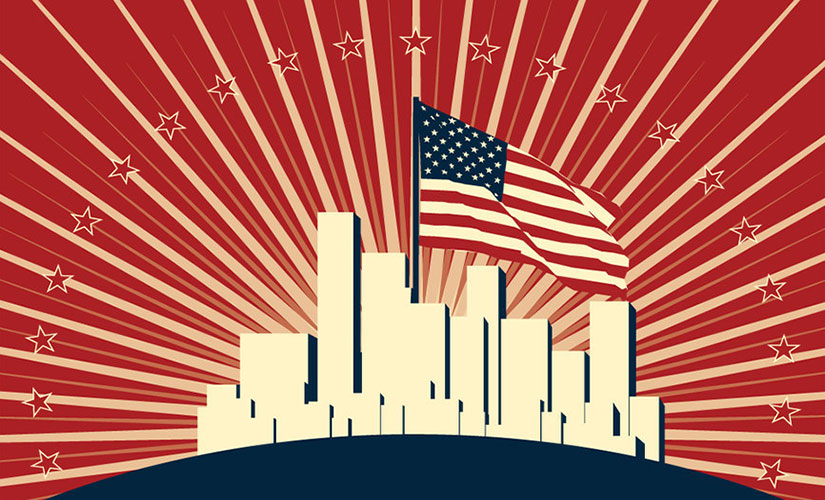
*Editor’s Note: On March 4, Russia enacted a law that criminalizes public opposition to, or independent news reporting about, the war in Ukraine. The law makes it a crime to call the war a “war” rather than a “special military operation” on social media or in a news article or broadcast. The law is understood to penalize any language that “discredits” Russia’s use of its military in Ukraine, calls for sanctions or protests Russia’s invasion of Ukraine. It punishes anyone found to spread “false information” about the invasion with up to 15 years in prison.
Konstantin Sukhoverkhov, the Program Coordinator at the Russian International Affairs Council, on the potential decline of American exceptionalism.
In the late 1990s and early 2000s, many Americans and virtually the entire American political elite thought that the 21st century would be the era of the U.S. In fact, at that time, it seemed that the U.S.’ hegemony was so indisputable that in the foreseeable future no one was likely to challenge Washington or reevaluate the current international situation.
Nevertheless, today American exceptionalism outside the U.S. is perceived as harmful. For example, the EU, amid recent geopolitical events, was highly disappointed with America’s Inflation Reduction Act of 2022, which is discriminatory against European goods in the U.S. market.
For instance, after his recent visit to the U.S., French President Emmanuel Macron openly expressed anger at Washington’s approach, which neglects the interests of the European allies. Moreover, Russia, China and some other countries regularly insinuate that American exceptionalism prevents the creation of a long-lasting multipolar world.
And in fairness, even though the “America First” motto is only associated with former U.S. President Donald Trump, it is difficult to recall moments when this country has not put itself first.
Among the main factors that led the U.S. political elites to realize America’s exceptionalism was the desire to liberalize and democratize public life. By the way, public life in the British North American colonies was already very free by the standards of the 18th century.
Even before the American Revolution, the U.S. Founding Fathers wrote about the shortcomings of monarchy and the importance of personal freedoms for everyone. They, like their associates, were to some extent idealists, inspired by the democracy of the Roman Republic, characterized by the people’s power and a clear organization of the state. Incidentally, for this reason, the U.S. has many state symbols that echo those of ancient Rome.
Indeed, it was difficult to argue with this particular interpretation of American exceptionalism at the time. The U.S. became the first state in hundreds of years to build democratic institutions. Hence, this definition of American exceptionalism had long existed in American political life. However, even then, this principle manifested itself not only in philosophical discussions but also served to fulfill American interests. For instance, it was at the heart of the annexation of some of the Spanish Empire territories (such as Texas and California), the temporary occupation of Cuba and the War of 1812 with the U.K., which was crucial for the U.S.’ territorial expansion in North America.
At the same time, American exceptionalism strengthened in the 20th century, as the U.S. perceived itself as the leader of the “free world” in the battle against communism. As a result, the U.S. began to conceptualize itself as a politically unique country regarding the level of freedom of its citizens and its culture and economy. This approach further developed after the American victory in the Cold War, entrenching the idea that a liberal economy and democratic values allowed Washington and its allies to defeat the Soviet Union.
Today this idea is promoted primarily by representatives of the Republican Party, as was evident in the 2022 midterm elections. However, former President Barack Obama and other Democrats have repeatedly referred to the concept.
Although the idea of American exceptionalism is still strong in the U.S., outside the country, it now has to fight for its survival. For example, while supporting Washington’s foreign policy, American allies in Europe are already skeptical of the U.S.’ actions. In addition, China is perceived as a force capable of undermining U.S. hegemony, particularly in economic terms. In fact, recently Beijing has been doing precisely this by pursuing its interests via the World Trade Organization and other international bodies, such as the United Nations Environment Programme. Russia, on the other hand, is now openly questioning the political exceptionalism of the U.S. in the international arena, just as it did during the last century.
Under these conditions, a situation is developing in which American exceptionalism will no longer have a place in global politics. Of course, local politicians may be able to justify their country’s exceptionalism to their population. However, this concept will definitely not be widely understood by other key players, such as Russia, China and the EU.
The author is the Program Coordinator of the Russian International Affairs Council. The author’s position may not necessarily reflect the views of Izvestia’s editorial board.

Leave a Reply
You must be logged in to post a comment.